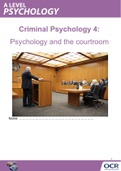Aransingh073
On this page, you find all documents, package deals, and flashcards offered by seller aransingh073.
- 6
- 0
- 1
Community
- Followers
- Following
7 items

Year 2 Psychology paper 3 practice questions
covers several different topics, including biopsychology, research methods, issues and debates in psychology, and relationships.
- Package deal
- • 6 items •
- Exam (elaborations) A2 Unit G543 - Options in Applied Psychology - Criminal • Exam (elaborations)
- Exam (elaborations) A2 Unit G543 - Options in Applied Psychology - criminal • Exam (elaborations)
- Exam (elaborations) A2 Unit G543 - Options in Applied Psychology • Exam (elaborations)
- Exam (elaborations) A2 Unit G543 - Options in Applied Psychology - Criminal, courtroom • Exam (elaborations)
- Exam (elaborations) A2 Unit G543 - Options in Applied Psychology Criminal, Crime prevention social • Exam (elaborations)
- And more ….
covers several different topics, including biopsychology, research methods, issues and debates in psychology, and relationships.

Exam (elaborations) A2 Unit G543 - Options in Applied Psychology Criminal, effects of imprisonment
The study of the effects of imprisonment is a complex and multifaceted area of research that involves a range of disciplines, including psychology, sociology, criminology, and law. Researchers in this area aim to understand the impact of imprisonment on individuals, families, communities, and society as a whole.
- Package deal
- Exam (elaborations)
- • 14 pages •
The study of the effects of imprisonment is a complex and multifaceted area of research that involves a range of disciplines, including psychology, sociology, criminology, and law. Researchers in this area aim to understand the impact of imprisonment on individuals, families, communities, and society as a whole.

Exam (elaborations) A2 Unit G543 - Options in Applied Psychology Criminal, Crime prevention social
Dealing with offending behavior: This topic covers the various approaches to dealing with criminal behavior, such as punishment, rehabilitation, and restorative justice. Treatment of offenders: Students will learn about the different types of treatment programs available for offenders, such as cognitive-behavioral therapy, anger management, and drug treatment.
- Package deal
- Exam (elaborations)
- • 15 pages •
Dealing with offending behavior: This topic covers the various approaches to dealing with criminal behavior, such as punishment, rehabilitation, and restorative justice. Treatment of offenders: Students will learn about the different types of treatment programs available for offenders, such as cognitive-behavioral therapy, anger management, and drug treatment.

Exam (elaborations) A2 Unit G543 - Options in Applied Psychology - Criminal, courtroom
Jury decision making: This topic covers the social and cognitive factors that influence jury decision making, such as group dynamics, decision-making heuristics, and the presentation of evidence.
- Package deal
- Exam (elaborations)
- • 16 pages •
Jury decision making: This topic covers the social and cognitive factors that influence jury decision making, such as group dynamics, decision-making heuristics, and the presentation of evidence.

Exam (elaborations) A2 Unit G543 - Options in Applied Psychology
Forensic psychology: This topic covers the application of psychology to the criminal justice system, including the assessment of offenders, psychological profiling, and the role of psychologists in legal proceedings.
- Package deal
- Exam (elaborations)
- • 12 pages •
Forensic psychology: This topic covers the application of psychology to the criminal justice system, including the assessment of offenders, psychological profiling, and the role of psychologists in legal proceedings.

Presentation AS Unit G542, Core Studies Psychodynamic approach, Freud
The psychodynamic approach is a theoretical perspective in psychology that emphasizes the role of unconscious thoughts and feelings in shaping behavior and personality. The approach was developed by Sigmund Freud and his followers, and it remains influential in contemporary psychology. Freud proposed a model of the mind consisting of three parts: the id, the ego, and the superego. The id is the primitive and instinctual part of the mind, driven by the pleasure principle and seeking immediate ...
- Presentation
- • 12 pages •
The psychodynamic approach is a theoretical perspective in psychology that emphasizes the role of unconscious thoughts and feelings in shaping behavior and personality. The approach was developed by Sigmund Freud and his followers, and it remains influential in contemporary psychology. Freud proposed a model of the mind consisting of three parts: the id, the ego, and the superego. The id is the primitive and instinctual part of the mind, driven by the pleasure principle and seeking immediate ...

Presentations AS Unit G542 - Core Studies
First, the presentation delves into Freud's Psychodynamic Theory, which posits that the human psyche is composed of three interconnected parts - the id, ego, and superego - that interact with each other to produce complex behavior patterns. The presentation examines the role of the unconscious in Freud's theory, as well as his ideas about repression, transference, and the Oedipus complex. Next, the presentation turns to Gould's Core Study on Biological Determinism, which argues that evolut...
- Presentation
- • 11 pages •
First, the presentation delves into Freud's Psychodynamic Theory, which posits that the human psyche is composed of three interconnected parts - the id, ego, and superego - that interact with each other to produce complex behavior patterns. The presentation examines the role of the unconscious in Freud's theory, as well as his ideas about repression, transference, and the Oedipus complex. Next, the presentation turns to Gould's Core Study on Biological Determinism, which argues that evolut...
